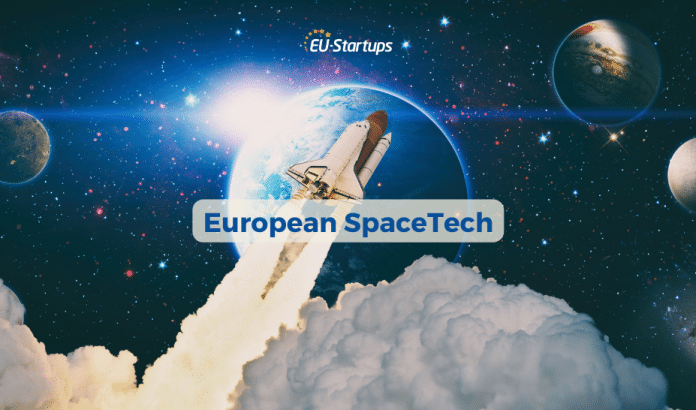For years, outer space exploration has captured our curiosity and imagination. But it’s remained very distant to most of us – one could only dream of being an astronaut or a scientist…
Things have changed though, and quickly. In 2023, space technologies are rapidly evolving and there’s been an explosion of business opportunities here on Earth. Spacetech is the next frontier for startups around the world as the private sector steps into a field once dominated by governments.
James Webb Telescope was the most recent landmark that renewed interest in the cosmos. At the same time, it seems like the “space race” has relaunched: private companies Virgin Galactic, Space X and Blue Origin have sprinted to transport the first space tourists. On the other hand, the frenzy around the launching of new satellites has intensified, with more than 2,100 being launched in the last year alone! Companies such as SpaceX/Starlink, OneWeb, Amazon and China’s StarNet propose to increase this number by tens of thousands in the coming years. But after all, what can all these satellites do for us, down here on Earth?
Since the late 1950s and in particular, since the launch of the Echo 1 satellite, we have had access to faster communications. Some of us will still remember the live broadcast on TV of the landing of man on the moon in 1969, only possible through the Intelsat satellite, reaching 600 million people simultaneously! Nowadays, we can thank the satellites to inform us about the weather, the fields we cultivate, the roads we travel or even the quality of the water, and experts say we’ve only scratched the surface of what’s possible.
In Europe, spacetech is growing at a skyrocketing pace. We decided to take a look at some of the continent’s most exciting companies that we think will be pivotal in shaping the future of the life on earth with space technology in the years to come:
 The Exploration Company: Headquartered in Munich, the company is a French-German endeavour with Hélène Huby as CEO and co-founder. Founded in 2021, its mission is to make space exploration more affordable and open. The team, made of former and experienced Airbus and ArianeGroup employees, is developing a group of reusable space capsules that would be a pragmatic and affordable alternative to the International Space Station. Nyx is a sustainable and reusable capsule that can fly cargo into space, resupply space stations and potentially transport humans. These capsules will be part of the logistics infrastructure to go to the moon and back. After the flights of two capsule demonstrators planned for 2023 and 2024, the Nyx capsule’s maiden flight is expected to take place in 2026. This February, the company raised a €40 million round, the biggest space tech Series A in Europe, co-led by EQT Group and Red River West.
The Exploration Company: Headquartered in Munich, the company is a French-German endeavour with Hélène Huby as CEO and co-founder. Founded in 2021, its mission is to make space exploration more affordable and open. The team, made of former and experienced Airbus and ArianeGroup employees, is developing a group of reusable space capsules that would be a pragmatic and affordable alternative to the International Space Station. Nyx is a sustainable and reusable capsule that can fly cargo into space, resupply space stations and potentially transport humans. These capsules will be part of the logistics infrastructure to go to the moon and back. After the flights of two capsule demonstrators planned for 2023 and 2024, the Nyx capsule’s maiden flight is expected to take place in 2026. This February, the company raised a €40 million round, the biggest space tech Series A in Europe, co-led by EQT Group and Red River West.
 Clear Space: ClearSpace is a Swiss company that aims to remove space debris. Although space seems immense, the available orbits around earth are limited and besides the 2100 active satellites orbiting Earth at the moment, there are also 3000 that are non-active and just floating “dead”. What’s more, there are around 34k pieces of space junk bigger than 10 centimetres in size and millions of smaller pieces that could nonetheless prove disastrous if they hit something else. Founded in 2018, the company is focusing on the removal of current debris as part of ClearSpace-1, a pioneer mission scheduled to launch in 2026 supported and mandated by ESA. In January 2023 ClearSpace closed a €26.7 million Series A round from a global team of venture capital investors led by OTB Ventures along with Swisscom Ventures.
Clear Space: ClearSpace is a Swiss company that aims to remove space debris. Although space seems immense, the available orbits around earth are limited and besides the 2100 active satellites orbiting Earth at the moment, there are also 3000 that are non-active and just floating “dead”. What’s more, there are around 34k pieces of space junk bigger than 10 centimetres in size and millions of smaller pieces that could nonetheless prove disastrous if they hit something else. Founded in 2018, the company is focusing on the removal of current debris as part of ClearSpace-1, a pioneer mission scheduled to launch in 2026 supported and mandated by ESA. In January 2023 ClearSpace closed a €26.7 million Series A round from a global team of venture capital investors led by OTB Ventures along with Swisscom Ventures.
 Neuraspace: Portuguese startup Neuraspace developed and recently launched its space traffic management platform aimed at satellite operators, insurers and regulators. The company is rapidly expanding and leads several R&D projects to develop advanced AI tools that can manage complex and ever-increasing satellite manoeuvres, motivated by increasing traffic and debris. Neuraspace’s platform is an automated solution designed to provide higher accuracy in detecting high-risk collisions and reducing human intervention by up to 75%. It’s AI technology enables more accurate satellite collision risk prediction and, by applying a data fusion strategy, offers increased robustness and resilience. Launched in 2020, the company recently raised a €2.5 million seed round led by Armilar Venture Partners.
Neuraspace: Portuguese startup Neuraspace developed and recently launched its space traffic management platform aimed at satellite operators, insurers and regulators. The company is rapidly expanding and leads several R&D projects to develop advanced AI tools that can manage complex and ever-increasing satellite manoeuvres, motivated by increasing traffic and debris. Neuraspace’s platform is an automated solution designed to provide higher accuracy in detecting high-risk collisions and reducing human intervention by up to 75%. It’s AI technology enables more accurate satellite collision risk prediction and, by applying a data fusion strategy, offers increased robustness and resilience. Launched in 2020, the company recently raised a €2.5 million seed round led by Armilar Venture Partners.
 Solstorm: Norwegian startup Solstorm is tackling the complex problem of space debris by enabling hybrid propulsion systems to deorbit rockets and satellites. Its system, Magbreak, does not use external engines, propellants, or internal supply for propulsion. It converts energy from the solar wind to propel satellites, rockets, and other space transport. When a rocket or satellite reaches the end of its useful life, Solstorm’s technology deploys and generates a magnetic field by harnessing power from the ionosphere without conventional rockets. The magnetic field induces electromagnetic drag that deorbits and disposes of the craft without leaving behind hazardous “space junk.”. The field induces electromagnetic drag that de-orbits and disposes of dead satellites after their mission is complete, thus minimizing space debris.
Solstorm: Norwegian startup Solstorm is tackling the complex problem of space debris by enabling hybrid propulsion systems to deorbit rockets and satellites. Its system, Magbreak, does not use external engines, propellants, or internal supply for propulsion. It converts energy from the solar wind to propel satellites, rockets, and other space transport. When a rocket or satellite reaches the end of its useful life, Solstorm’s technology deploys and generates a magnetic field by harnessing power from the ionosphere without conventional rockets. The magnetic field induces electromagnetic drag that deorbits and disposes of the craft without leaving behind hazardous “space junk.”. The field induces electromagnetic drag that de-orbits and disposes of dead satellites after their mission is complete, thus minimizing space debris.
 Satellite Vu: This London-based startup, launched in 2016, is aiming to be “the Earth’s thermometer in space”. It uses infrared and thermal imaging technology to monitor the temperature of areas and objects on Earth, down to a single building. The technology could be used to monitor anything from the energy efficiency of buildings to whether sewage is being illegally pumped into waterways (the sewage would be at a higher temperature and therefore visible) among other use cases. The company focus on supporting decision-making around the world related to the Energy industry, Natural Disaster responders, Building operators and Plastics clean-up operations. Founded in 2016, the company raised a €20 million Series A round from investors including Seraphim Space Capital and Molten Ventures. It is due to launch the first of seven planned satellites in 2023.
Satellite Vu: This London-based startup, launched in 2016, is aiming to be “the Earth’s thermometer in space”. It uses infrared and thermal imaging technology to monitor the temperature of areas and objects on Earth, down to a single building. The technology could be used to monitor anything from the energy efficiency of buildings to whether sewage is being illegally pumped into waterways (the sewage would be at a higher temperature and therefore visible) among other use cases. The company focus on supporting decision-making around the world related to the Energy industry, Natural Disaster responders, Building operators and Plastics clean-up operations. Founded in 2016, the company raised a €20 million Series A round from investors including Seraphim Space Capital and Molten Ventures. It is due to launch the first of seven planned satellites in 2023.
 Mission Space: When the sun experiences a giant magnetic eruption it creates a solar wind consisting of charged particles, travelling at high speeds and causing electromagnetic fields that induce extreme currents in wires, disrupting satellite operations and even causing widespread power outages – also known as space storms. Based in Luxembourg, Mission Space provides space weather monitoring with LEO (Lower Earth Orbit) network of innovative detectors and analytics, capable of proving dedicated information. These sensors take in-situ measurements of the near-Earth magnetic and solar wind conditions as well as highly energetic particle streams from interplanetary shocks and the Sun. Born in 2020, the startup’s software analyses this data and offers real-time updates on the ground about space weather changes, thus, acting as a decision support tool to detect and prevent space weather radiation risks. Moreover, it models and predicts various space weather scenarios, enabling researchers to better understand space weather trends and risks.
Mission Space: When the sun experiences a giant magnetic eruption it creates a solar wind consisting of charged particles, travelling at high speeds and causing electromagnetic fields that induce extreme currents in wires, disrupting satellite operations and even causing widespread power outages – also known as space storms. Based in Luxembourg, Mission Space provides space weather monitoring with LEO (Lower Earth Orbit) network of innovative detectors and analytics, capable of proving dedicated information. These sensors take in-situ measurements of the near-Earth magnetic and solar wind conditions as well as highly energetic particle streams from interplanetary shocks and the Sun. Born in 2020, the startup’s software analyses this data and offers real-time updates on the ground about space weather changes, thus, acting as a decision support tool to detect and prevent space weather radiation risks. Moreover, it models and predicts various space weather scenarios, enabling researchers to better understand space weather trends and risks.
 Skyrora: Going to space doesn’t necessarily require a rocket – and that’s what Skyrora wants to help develop. Out of the more than 100 companies already working in this space, Skyrora has a unique approach as their team designs, manufactures, and deploys rockets that focus on and target small satellite manufacturers. With headquarters in Edinburgh, they already have different facilities located across Europe in Germany, Slovakia and Ukraine. Last October, they tested the Skylark L single-stage suborbital launch vehicle from Iceland and they’re planning another launch from Iceland this year, whilst preparing for a first orbital launch attempt with the Skyrora XL. Skyrora XL is a three-stage rocket using 3D-printed engines designed to place payloads weighing up to 315 kg to Polar and Sun-Synchronous orbits. Founded in 2017, the aim is to make the future of space sustainable.
Skyrora: Going to space doesn’t necessarily require a rocket – and that’s what Skyrora wants to help develop. Out of the more than 100 companies already working in this space, Skyrora has a unique approach as their team designs, manufactures, and deploys rockets that focus on and target small satellite manufacturers. With headquarters in Edinburgh, they already have different facilities located across Europe in Germany, Slovakia and Ukraine. Last October, they tested the Skylark L single-stage suborbital launch vehicle from Iceland and they’re planning another launch from Iceland this year, whilst preparing for a first orbital launch attempt with the Skyrora XL. Skyrora XL is a three-stage rocket using 3D-printed engines designed to place payloads weighing up to 315 kg to Polar and Sun-Synchronous orbits. Founded in 2017, the aim is to make the future of space sustainable.
 Descartes: Descartes is a French startup that focuses on insurance and climate risks. In order to protect assets against natural catastrophes, weather and other risks they use a data-driven approach, using both machine learning and real-time monitoring from satellites. Launched in 2018, Descartes’ new approach, Parametric Insurance, is unlike traditional insurance, which relies on lengthy loss adjustment procedures. Parametric insurance pays out when a predefined event (flood, cyclone, earthquake, etc.) occurs as measured by a specified parameter or index, with no on-the-ground loss adjustment required. In 2022, Descartes raised a €120 million Series B round to further develop its technology platform, expand new business verticals, and continue global expansion plans.
Descartes: Descartes is a French startup that focuses on insurance and climate risks. In order to protect assets against natural catastrophes, weather and other risks they use a data-driven approach, using both machine learning and real-time monitoring from satellites. Launched in 2018, Descartes’ new approach, Parametric Insurance, is unlike traditional insurance, which relies on lengthy loss adjustment procedures. Parametric insurance pays out when a predefined event (flood, cyclone, earthquake, etc.) occurs as measured by a specified parameter or index, with no on-the-ground loss adjustment required. In 2022, Descartes raised a €120 million Series B round to further develop its technology platform, expand new business verticals, and continue global expansion plans.
 Mavuno: Technology can have a deeper social impact and Mavuno is such an example – they’re empowering African farmers. Based both in Berlin and Tanzania, Mavuno uses satellite images and machine learning to enable farmers to manage and improve their crops. The tech solution is easily accessible via a mobile app, democratising access to satellite technology. Agriculture is a vital sector for the African continent and employs the majority of the population (450 million smallholder farmers). However, the sector is facing several challenges, such as a lack of access to funding and technology, which limit the potential of farmers to increase their productivity and income. Agritech solutions are powerful tools that Europeans already use and Mavuno is democratizing its access, starting with cashew producers in Tanzania. Founded in 2021, the company has secured over €463k.
Mavuno: Technology can have a deeper social impact and Mavuno is such an example – they’re empowering African farmers. Based both in Berlin and Tanzania, Mavuno uses satellite images and machine learning to enable farmers to manage and improve their crops. The tech solution is easily accessible via a mobile app, democratising access to satellite technology. Agriculture is a vital sector for the African continent and employs the majority of the population (450 million smallholder farmers). However, the sector is facing several challenges, such as a lack of access to funding and technology, which limit the potential of farmers to increase their productivity and income. Agritech solutions are powerful tools that Europeans already use and Mavuno is democratizing its access, starting with cashew producers in Tanzania. Founded in 2021, the company has secured over €463k.
 Entocycle: Spacetech can also change the way we produce food. That’s what Entocycle is doing in a very unconventional but scalable way: insect farming. The company’s modular and automated indoor system allows farmers to create sustainable insect protein from organic waste, anywhere in the world, 365 days a year. In so doing, Entocycle makes healthy food for farmed animals without harmful effects on the planet. Space technologies and assets used for Spaceflight and Earth Observation created amazing learnings from the interoperability of different IoT systems, creating a smart process that required rigorous environmental conditions. By using hyperspectral imaging cameras and other IoT technologies, Entocycle has been able to create an efficient method to help convert waste organic matter into protein by means of insects. Founded in 2015, their mission is to accelerate a global shift to sustainable protein using insects, technology and innovation. The startup began 2023 with a €4.6 million raise.
Entocycle: Spacetech can also change the way we produce food. That’s what Entocycle is doing in a very unconventional but scalable way: insect farming. The company’s modular and automated indoor system allows farmers to create sustainable insect protein from organic waste, anywhere in the world, 365 days a year. In so doing, Entocycle makes healthy food for farmed animals without harmful effects on the planet. Space technologies and assets used for Spaceflight and Earth Observation created amazing learnings from the interoperability of different IoT systems, creating a smart process that required rigorous environmental conditions. By using hyperspectral imaging cameras and other IoT technologies, Entocycle has been able to create an efficient method to help convert waste organic matter into protein by means of insects. Founded in 2015, their mission is to accelerate a global shift to sustainable protein using insects, technology and innovation. The startup began 2023 with a €4.6 million raise.
By the way: If you’re a corporate or investor looking for exciting startups in a specific market for a potential investment or acquisition, check out our Startup Sourcing Service




